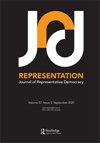Market-oriented Political Engagement – A Problematised Ideal? Attitudes Towards Political Consumerism among Elected Representatives in Sweden
Q2 Social Sciences
引用次数: 0
Abstract
Market-oriented political participation, often referred to as political consumerism, is one of the most rapidly proliferating modes of citizen participation in the Western world. Argued to circumvent the political sphere, this rising mode of engagement has caused scholars to consider the relationship between political consumerism and the functioning of representative democracy. So far, however, the implications of market-oriented participation for the role of elected representatives have been widely overlooked. Drawing from the theory of responsibilisation, I consider whether political consumerism, by circumventing the traditional political arena, risk challenging the role of representatives as responsible actors within the confines of representative democracy. Resorting to a mixed-method approach, using data from the online panel of Swedish politicians, as well as interview material with Swedish MPs, this article investigates representatives’ attitudes to political consumerism and finds a considerable support among the elected, with the greatest approval among representatives to the left. But when considered in relation to representative democracy, political consumerism is argued to challenge its core functions, including the responsibility and accountability assigned to representatives. Together the results accentuate a strong reliance on market-oriented participation among representatives in Sweden, but also a recognition of potential democratic perils related to the same.以市场为导向的政治参与——一个有问题的理想?瑞典民选代表对政治消费主义的态度
以市场为导向的政治参与,通常被称为政治消费主义,是西方世界发展最快的公民参与模式之一。为了规避政治领域,这种不断上升的参与模式促使学者们考虑政治消费主义与代议制民主的运作之间的关系。然而,迄今为止,以市场为导向的参与对当选代表作用的影响被广泛忽视。从责任理论出发,我考虑政治消费主义是否会绕过传统的政治舞台,在代议制民主的范围内挑战代表作为负责任的行动者的角色。本文采用混合方法,使用瑞典政治家在线小组的数据,以及瑞典国会议员的访谈材料,调查代表对政治消费主义的态度,并在当选议员中获得相当大的支持,其中左派代表的支持率最高。但是,当考虑到代议制民主时,政治消费主义被认为挑战了其核心功能,包括分配给代表的责任和问责制。总之,这些结果突出了瑞典代表对以市场为导向的参与的强烈依赖,但也认识到与此相关的潜在民主危险。
本文章由计算机程序翻译,如有差异,请以英文原文为准。
求助全文
约1分钟内获得全文
求助全文
来源期刊

Representation
Social Sciences-Sociology and Political Science
CiteScore
3.50
自引率
0.00%
发文量
31
期刊介绍:
This change in scope follows two paths. Firstly, it seeks contributors who are interested in exploring the interface between democratic practice and theory. In particular, this focus seeks contributions that apply theoretical insights to actual examples of current practice. Secondly, while not neglecting the current focus of the journal, we would like to expand its international coverage so that the journal will offer our readers insights in the state of democracy worldwide.
 求助内容:
求助内容: 应助结果提醒方式:
应助结果提醒方式:


